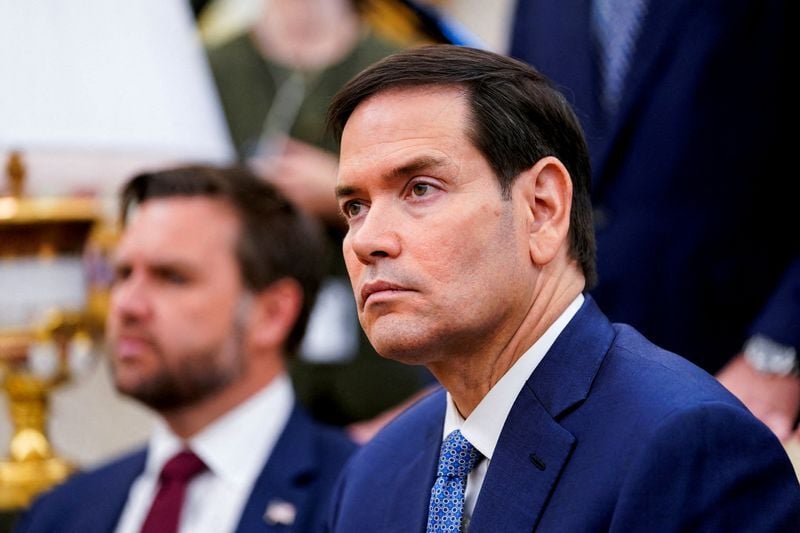Exclusive-Rubio orders US diplomats to launch lobbying blitz against Europe’s tech law
By Humeyra Pamuk
WASHINGTON (Reuters) -President Donald Trump’s administration has instructed U.S. diplomats in Europe to launch a lobbying campaign to build opposition to the European Union’s Digital Services Act (DSA), which Washington says stifles free speech and imposes costs on U.S. tech companies, an internal diplomatic cable seen by Reuters showed.
In a State Department cable dated August 4, signed by U.S. Secretary of State Marco Rubio, the agency said the EU was pursuing “undue” restrictions on freedom of expression in its efforts to combat hateful speech, misinformation and disinformation, and the DSA was further enhancing these curbs.
The EU’s DSA is a landmark law meant to make the online environment safer and fairer by compelling tech giants to do more to tackle illegal content, including hate speech and child sexual abuse material.
Yet Trump has made combating censorship – particularly what he sees as the stifling of conservative voices online – a major theme of his administration. Top U.S. officials, including Vice President JD Vance, have focused on European officials and regulations, accusing them of “censoring” Americans, an accusation that the European Union rejects.
The cable, whose headline described it as an “action request”, tasked American diplomats across U.S. embassies in Europe with regularly engaging with EU governments and digital services authorities to convey U.S. concerns about the DSA and the financial costs for U.S. companies.
“Posts should focus efforts to build host government and other stakeholder support to repeal and/or amend the DSA or related EU or national laws restricting expression online,” the cable said in its “objective” section.
FREEDOM OF EXPRESSION
It provided specific suggestions to U.S. diplomats on how the EU law may be changed, and talking points to help them make that argument.
State Department did not comment for this story.
A spokesperson for the EU Commission declined to comment on the cable but said freedom of expression is a fundamental right across the bloc. “We firmly rebut any censorship claims. The censorship allegations relative to the DSA are completely unfounded,” the spokesperson said.
In March, the EU’s antitrust and tech chiefs told U.S. lawmakers that the new tech rule aimed to keep digital markets open and is not targeted at U.S. companies.
The Commission has also pushed back against speculation that the 27-member EU’s tech regulatory regime could be included in EU-U.S. trade negotiations. “Our legislation will not be changed. The DMA (Digital Markets Act) and the DSA are not on the table in the trade negotiations with the U.S.,” Commission spokesperson Thomas Regnier told a daily news conference.
The order to U.S. diplomats marks an acceleration of the administration’s efforts to promote what it calls “America’s free-speech tradition,” a policy that has added friction to the already fraught U.S. relationship with European allies.
That policy came into focus in February, when Vance stunned European leaders by accusing them – at a conference usually known for displays of transatlantic unity – of censoring the speech of groups such as Germany’s right-wing AfD party and backsliding on democracy.
FALSE CLAIMS
During his trip, Vance went on to meet with the leaders of the AfD — classified by Germany’s domestic intelligence service as a suspected extremist group — which became the country’s largest opposition party after the February election.
Trump and his Republican allies have repeatedly accused the administration of Democratic former President Joe Biden of encouraging suppression of free speech on online platforms, claims that have centered on efforts to stem false claims about vaccines and elections.
The U.S. Supreme Court ruled last year that the Biden administration’s contacts with social media companies did not violate America’s First Amendment protections around free speech.
The directive by the State Department ordered U.S. diplomats to investigate any claims of censorship, which it described as “any government efforts to suppress protected forms of expression or coerce private companies to do the same”, adding that the priority should be given to any incidents that impact U.S. citizens and companies.
Their investigation should include any related arrests, court cases, property seizures and online suspensions, it said.
“Posts should meet with government officials, businesses, civil society, and impacted individuals to report on censorship cases, including but not limited to those related to the DSA,” the cable said.
In March, the chairman of the U.S. Federal Communications Commission (FCC) specifically criticized the DSA, saying it was not compatible with America’s free speech tradition.
In May, Rubio threatened visa bans for people who “censor” speech by Americans, including on social media, and suggested the policy could target foreign officials regulating U.S. tech companies.
“OVERLY BROAD CONTROLS”
U.S. tech companies like Facebook and Instagram parent Meta have weighed in too, saying the DSA amounts to censorship of their platforms.
Tesla Chief Executive Elon Musk, who also owns social media company X, was a leading adviser to the U.S. president before the two fell out, while the bosses of Amazon, Meta and Google-owner Alphabet (GOOGL.O) took prominent spots at Trump’s inauguration in January.
Rubio’s directive takes particular aim at the DSA’s description of illegal content, saying it was expansive, and told U.S. diplomats to advocate to get the definition of “illegal content” narrowed so that it would not curb freedom of expression, including in political and religious discourse.
Another suggestion was to withdraw or amend the Code of Conduct on Disinformation, a framework under the DSA, which the State Department said was setting “overly broad controls” on content in a way that was undermining freedom of expression.
Other talking points included removing or reducing fines for non-compliance to content restrictions, and not relying on “trusted flaggers”, entities designated by national authorities to report illegal online content to platforms.
(Reporting by Humeyra Pamuk; editing by Diane Craft and David Holmes)





